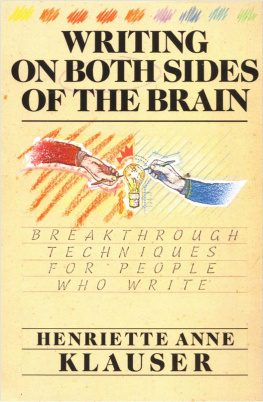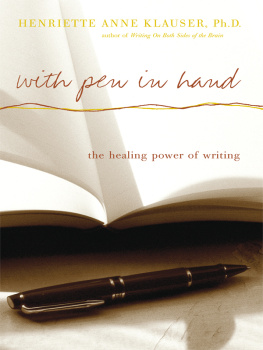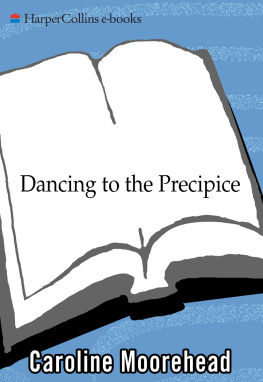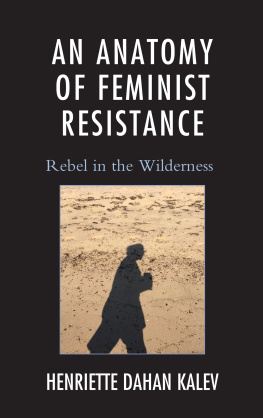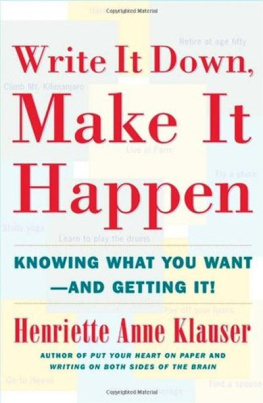Henriette A. Klauser - Writing on Both Sides of the Brain
Here you can read online Henriette A. Klauser - Writing on Both Sides of the Brain full text of the book (entire story) in english for free. Download pdf and epub, get meaning, cover and reviews about this ebook. year: 2019, publisher: HarperCollins, genre: Romance novel. Description of the work, (preface) as well as reviews are available. Best literature library LitArk.com created for fans of good reading and offers a wide selection of genres:
Romance novel
Science fiction
Adventure
Detective
Science
History
Home and family
Prose
Art
Politics
Computer
Non-fiction
Religion
Business
Children
Humor
Choose a favorite category and find really read worthwhile books. Enjoy immersion in the world of imagination, feel the emotions of the characters or learn something new for yourself, make an fascinating discovery.
- Book:Writing on Both Sides of the Brain
- Author:
- Publisher:HarperCollins
- Genre:
- Year:2019
- Rating:3 / 5
- Favourites:Add to favourites
- Your mark:
- 60
- 1
- 2
- 3
- 4
- 5
Writing on Both Sides of the Brain: summary, description and annotation
We offer to read an annotation, description, summary or preface (depends on what the author of the book "Writing on Both Sides of the Brain" wrote himself). If you haven't found the necessary information about the book — write in the comments, we will try to find it.
Writing on Both Sides of the Brain — read online for free the complete book (whole text) full work
Below is the text of the book, divided by pages. System saving the place of the last page read, allows you to conveniently read the book "Writing on Both Sides of the Brain" online for free, without having to search again every time where you left off. Put a bookmark, and you can go to the page where you finished reading at any time.
Font size:
Interval:
Bookmark:
To Jim, my own true love, who combines logic and sensitivity, reason and
intuition, gentleness with strong masculinity: you are one of the most naturally
whole-brained people I know.
And to Dorothy, whose friendship is a deep well of strength.
Are you a businessperson who is tired of wasting valuable time laboring over written work, a student with five term papers due in one week, all left until the last minute, a freelance writer with a secret desire to win a Pulitzer Prize? This book is for you. It will show you how to make procrastination work for you instead of against you, how to capitalize on times of incubation when your inspiration is at a peak.
Did you ever watch a colleague in your office dash off a memo or compose a major report with apparent ease, and wish to yourself, If only I had such command over words! If only I could write more confidently! This book is for you. It will change the nature of your relationship with writing forever.
Have you envied the novelist who has just published her third novel, has sold the movie rights to the highest bidder, and is eagerly working on novel number four? This book is for you. It will increase your writing productivity dramatically and teach you how to tell the story inside of you in your own unique voice.
The basis for this book is the belief that writing and editing are two separate brain functions and that the problems we have with expressing ourselves fluently in writing arise from doing both tasks simultaneously. The purpose of this book is to give you a new approach to writing, one that will first free up your creative side and help you to produce your best writing ever and then will hone your editing skills, when they are put in their proper place, to a keen edge. This approach will provide you with writing tools and techniques that will serve you well for the rest of your life.
Writing on Both Sides of the Brain grew out of the workshops I have given over the past several years, where people who felt anxious or unhappy about their writing applied these techniques and discovered dramatic differences in the way they write. This book offers the workshop in book form; it presents the same techniques I offer there and can provide the same long-lasting results for you.
Writing on Both Sides of the Brain will teach you how to fish, and will feed you for a lifetime.
What This Book Will Do for You
If you have a carping voice inside of you that criticizes your work and edits everything as you write it, Writing on Both Sides of the Brain will teach you to talk back, to turn your Inner Critic into your ally. You will know when to edit and when not to edit and how to go about it most effectively.
If you need to write as an integral part of your job, write for publication, or if you simply find yourself stymied by thank-you notes and ordinary correspondence, Writing on Both Sides of the Brain will help you get rid of the sinking sensation before a blank page. It will show you how to increase the speed of composition, introduce you to an innovative approach to outlining, and help you unlearn the writing habits that inhibit you.
My intent in writing this book is to change your life. I am not afraid to be so blunt, since I have seen the principles of writing detailed here work wonders in peoples lives. Businesspeople, lawyers, freelance writers, doctors, teachers, students, administrators, lobbyists, elected officials, and government employeespeople from a diversity of professionshave taken my writing workshop and applied these techniques to their professional and personal writing with astonishing results. These concepts have radically changed the way they approach whatever writing they are doing. Writing has ceased to be a problem for me, one of my former students said matter-of-factly when I met her again five years after she had taken my class. I simply write whatever I need to write and move on to other things.
So that is my intent: to change, radically and permanently, the way you feel about writing and, consequently, to improve the power and persuasion of your finished product.
But the real power of this book lies inside of you. What is your intent in reading this book? In doing the exercises? What would you like to see happen, professionally and personally? What are your goals? Be specific. Write them down.
Take full responsibility for what occurs when you read this book, do the exercises, and incorporate the ideas into your daily writing. Make it your intent that this will be the most powerful, influential, exciting, mind-bending book that you have ever read. (I happen to think that this is a useful attitude toward any book you are reading, any course you are embarking on.) Decide that the change in you will not be just a slight one but a 180-degree turnaround. Make that your intention, own it as a goal, and then go for it, all the way.
I did not intend this book to be a library reference work or a coffee-table showpiece. You have my permission to write in its pages, tack up over your computer or workspace the charts that appeal to you, dog-ear its edges, bend down its corners, use rubber bands and clips to mark off sections to return to. Follow Francis Bacons injunction:
Read not to contradict and confute; nor to believe and take for granted; nor to find talk and discourse; but to weigh and consider. Some books are to be tasted, others, to be swallowed, and some few to be chewed and digested.
This book was designed to be devoured. I trust you have a voracious appetite.
How This Book Came to Be
A book that concerns itself with the process of writing owes a debt to its readers to say how it got written. I am, after all, doing what I am talking about doing, and in that way the process is different from lecturing. I am attempting to do for myself what I set out to help you do for yourself. I need to draw on all of my own devices in order to get these words on paper. Without practicing my own injunctions, I would have soon lost heart, and this book would not be.
Did you ever hear someone say, Id like to write a book, but I dont have the time? In todays hurried age, people usually dont write books because they have the time to do it. I wrote this book while stopping at a red light, waiting in line at the post office, sitting by the edge of the pool during the childrens swim lessons. I wrote it during intermissions at the opera, in the back of darkened movie theaters, during banquet speeches and luncheon lectures, in between family dental appointments and piano lessons and soccer practice. I have a reverence for paper and daily bless its Chinese inventor. I buy paper by the reams and still never have enough of it. I wrote this book on napkins, on the corners of placemats, on the backs of envelopes, on Post-it pads of all sizes and colors, in the several notebooks, big and small, that I carry with me. I wrote with anything handy (although I do have my favorite tools, among them two Mont Blancs and a 1922 Esterbrook, oblique nib). Later, I fed the written words into a computer, and sometimes I had the luxury of composing at the keyboard. I began each chapter with branching, a system of generating ideas and organizing material explained in . I did all my branches in multicolor and sometimes used pictures as well as words to capture my thoughts.
I can write volumes in the midst of confusion, and I can easily write on the run. But I do need solitude in order to edit. It is hard for me to take the confusion out of my writing when I am surrounded by confusion. My environment needs to reflect my minds work. When I was in graduate school, I would go to the campus libraryespecially my favorite room upstairs, where I was often solitary and could look out the Gothic windows and watch the tops of the trees sway in a stormand spend as many as eight or ten hours in the same spot, pulling it all together. But I could do the preliminary work while I was out on a date. The same modus operandi applied here: I retreated for my editing.
Font size:
Interval:
Bookmark:
Similar books «Writing on Both Sides of the Brain»
Look at similar books to Writing on Both Sides of the Brain. We have selected literature similar in name and meaning in the hope of providing readers with more options to find new, interesting, not yet read works.
Discussion, reviews of the book Writing on Both Sides of the Brain and just readers' own opinions. Leave your comments, write what you think about the work, its meaning or the main characters. Specify what exactly you liked and what you didn't like, and why you think so.

